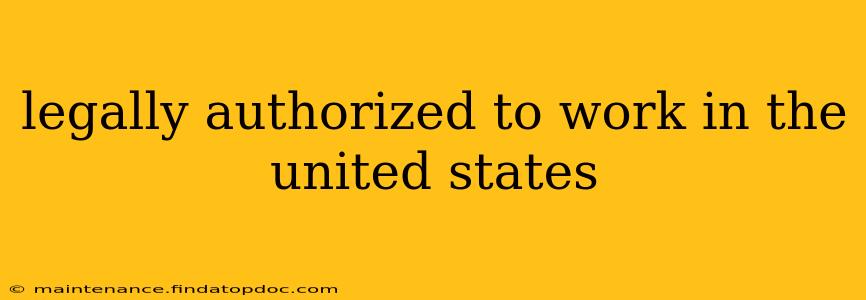Navigating the complexities of U.S. immigration law can be daunting. Understanding what it means to be "legally authorized to work" in the United States is crucial for both employers and employees. This comprehensive guide clarifies the various pathways to work authorization and addresses common questions surrounding this important topic.
What Does "Legally Authorized to Work" Mean?
Being legally authorized to work in the United States means you possess the necessary documentation and permission from the U.S. government to accept employment. This authorization isn't simply a matter of having a visa; it requires a specific type of visa or other documentation explicitly granting work permission. Working without proper authorization is illegal and can have severe consequences.
How Can I Prove I'm Legally Authorized to Work?
Proof of authorization typically comes in the form of specific documents. These documents verify your identity and your legal right to work within the country. Common forms of acceptable documentation include:
-
Employment Authorization Document (EAD): This is a physical card issued by U.S. Citizenship and Immigration Services (USCIS) granting explicit permission to work. It's often linked to specific immigration statuses, such as asylum seekers or those with pending applications.
-
Passport with appropriate visa: Certain visas, such as the H-1B (specialty occupation), L-1 (intracompany transferee), or E-2 (treaty investor), automatically grant work authorization. The passport itself, combined with the visa, serves as proof.
-
Social Security Card: While not direct proof of work authorization, a Social Security number (SSN) is typically obtained once you have a valid work permit. The card itself isn't sufficient, but it's often requested as part of the employment process. It’s crucial to note that having an SSN does not automatically mean you are legally authorized to work; it only means you have a number to use for tax purposes.
What are the Different Ways to Obtain Work Authorization?
Several avenues lead to legal work authorization in the U.S. The most common include:
-
Family-based immigration: Sponsorship by a U.S. citizen or lawful permanent resident. This process can take several years and involves a complex application.
-
Employment-based immigration: Securing a job offer from a U.S. employer who sponsors the employee for a work visa. This is common for high-skilled workers and specialized professions.
-
Refugee or asylum status: Individuals granted refugee or asylum status are typically authorized to work after a certain period.
-
Temporary work visas: Various temporary worker programs exist, catering to specific needs like seasonal agricultural work or specialized skills. Examples include H-2B visas (non-agricultural temporary workers) and H-2A visas (agricultural workers).
-
Certain nonimmigrant visas: Some nonimmigrant visas, like the F-1 (student) visa, allow for limited work authorization under certain circumstances, such as Optional Practical Training (OPT).
What Happens if I Work Without Authorization?
Working without authorization can lead to serious consequences, including:
-
Deportation: The most significant consequence is removal from the United States.
-
Fines: Substantial financial penalties can be imposed on both the employee and the employer.
-
Criminal charges: In some cases, working without authorization can result in criminal charges and imprisonment.
-
Difficulty obtaining future visas: A history of unauthorized work can significantly impact future attempts to obtain a U.S. visa.
What if My Work Authorization Expires?
It is crucial to renew your work authorization before it expires. Failure to do so will render you ineligible to work legally. The renewal process varies depending on your immigration status and the type of work authorization you hold. Consult with an immigration attorney to ensure a smooth and timely renewal.
How Do I Know if My Employer is Verifying My Work Authorization?
The Immigration Reform and Control Act of 1986 (IRCA) requires employers to verify the eligibility of all employees to work in the United States. This is typically done using Form I-9, Employment Eligibility Verification. Your employer should provide you with this form to complete and should retain a copy. If you have any concerns about your employer's compliance, you may wish to contact an immigration lawyer.
This information is for guidance only and does not constitute legal advice. For specific legal advice on your individual circumstances, you should consult with an experienced immigration attorney.
